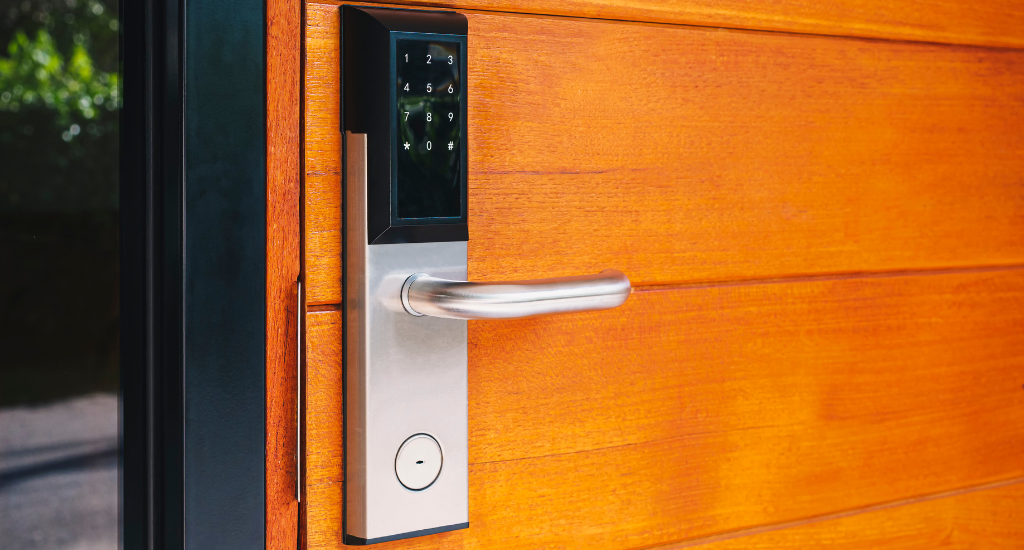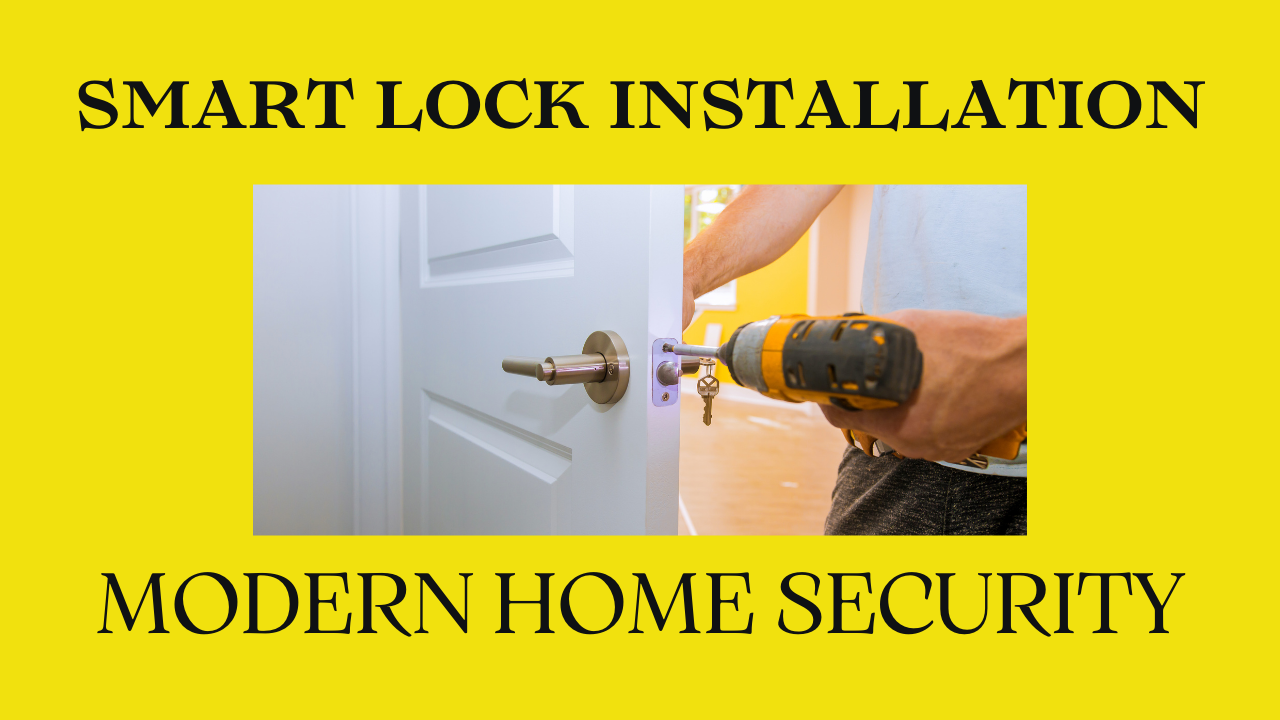Smart Lock Installation: A Modern Home Security Solution
In today’s rapidly advancing technological world, the rise of smart home technology has significantly transformed how we approach home security. With innovative devices designed to enhance convenience and safety, smart locks have emerged as a key player in modern home protection. Smart locks, with their array of advanced features, are becoming an essential component for homeowners seeking to upgrade their security systems. This article delves into the intricacies of smart lock installation, exploring its benefits, considerations, and future trends to provide a comprehensive guide for those considering this modern home security solution.
Understanding Smart Locks
Types of Smart Locks
Smart locks come in various forms, each offering unique features tailored to different security needs. Keypad locks, for instance, allow users to enter a numerical code to unlock the door, eliminating the need for physical keys. Biometric locks, on the other hand, use fingerprint recognition technology to grant access, ensuring a highly secure and personalized entry method. Bluetooth-enabled locks can be controlled via smartphones, offering the convenience of keyless entry from a short range. Lastly, Wi-Fi-connected locks provide remote access, allowing users to lock or unlock their doors from anywhere in the world through an internet connection.
Key Features
One of the standout features of smart locks is their ability to offer remote access and control. This means homeowners can lock or unlock their doors even when they are not physically present, adding a significant layer of convenience and security. Smart locks also integrate seamlessly with smart home systems, enabling users to create customized security settings and routines. Additionally, they provide activity logs and alerts, allowing homeowners to monitor who enters and exits their property in real-time. Temporary and permanent access codes can be generated for guests or service providers, ensuring controlled and flexible access.
How Smart Locks Work
Smart locks operate through a combination of mechanical and electronic components. The basic mechanics involve replacing the traditional lock mechanism with an electronically controlled system. These locks typically connect to a smartphone app via Bluetooth or Wi-Fi, enabling remote control and monitoring. Compatibility with other smart home devices allows for integration into a broader security network, enhancing overall home protection.
Benefits of Installing Smart Locks
Enhanced Security
One of the primary advantages of smart lock installation is the significant enhancement in home security. Smart locks employ advanced encryption and security protocols to safeguard against unauthorized access. The elimination of physical keys reduces the risk of key duplication or theft. Moreover, the ability to receive real-time alerts and monitor activity logs ensures that homeowners are always aware of who is entering or exiting their property.
Convenience and Accessibility
Smart locks offer unparalleled convenience and accessibility. The ability to lock or unlock doors remotely means homeowners no longer need to worry about leaving keys under the mat or rushing home to let in guests. Managing access permissions is also simplified, with temporary codes that can be generated for visitors or service providers. This flexibility ensures that homeowners maintain control over who has access to their property at all times.
Integration with Home Automation Systems
Smart locks are designed to integrate seamlessly with other smart home devices, creating a cohesive and automated security system. This integration allows homeowners to set up customized security routines, such as automatically locking doors at a certain time or triggering security cameras when the door is unlocked. The ability to manage all security devices from a single app enhances user experience and streamlines home management.
Peace of Mind
The peace of mind that comes with smart lock installation cannot be overstated. Real-time notifications and activity logs provide homeowners with constant updates on the status of their locks. The user-friendly interfaces of smart lock apps ensure that managing home security is straightforward and accessible to everyone, regardless of technical expertise.
Considerations Before Installing Smart Locks
Compatibility with Existing Door Hardware
Before proceeding with smart lock installation, it is crucial to ensure that the chosen lock is compatible with existing door hardware. Some smart locks may require specific door types or configurations, and not all doors are suitable for every model. Checking compatibility helps avoid installation issues and ensures optimal performance.
Power Source and Battery Life
Smart locks typically rely on battery power, making battery life an important consideration. Homeowners should opt for models with long-lasting batteries and consider how often they are willing to replace them. Some smart locks offer low battery alerts, ensuring that homeowners are notified when it’s time for a replacement.
Security Concerns and Vulnerabilities
While smart locks offer enhanced security, they are not immune to vulnerabilities. Potential for hacking is a concern, as any internet-connected device can be targeted by cybercriminals. However, many smart locks incorporate advanced encryption and security measures to mitigate these risks. Homeowners should research and select locks with strong security features and stay informed about updates and patches.
Cost and Budgeting
The cost of smart lock installation can vary widely depending on the model and features. It is essential to consider both the initial investment and potential long-term savings. While smart locks may have a higher upfront cost compared to traditional locks, they can save money on locksmith services and provide added value through enhanced security and convenience.
Professional Installation vs. DIY
Deciding between professional installation and a DIY approach is another important consideration. Professional installation ensures that the lock is correctly fitted and functioning, which can be especially beneficial for those less comfortable with technology. However, many smart locks are designed for easy DIY installation, offering step-by-step guides and customer support.
Step-by-Step Guide to Installing a Smart Lock
Pre-Installation Preparation
Proper preparation is crucial for a successful smart lock installation. Start by choosing the right smart lock that meets your security needs and is compatible with your door. Ensure you have all necessary tools and materials, such as screwdrivers, a drill, and the lock’s installation kit.
Installation Process
- Removing the Old Lock: Begin by removing the existing lock. This usually involves unscrewing the lock from the door and removing all components, including the deadbolt and strike plate.
- Installing the New Smart Lock: Follow the manufacturer’s instructions to install the new smart lock. This typically involves attaching the new deadbolt, installing the exterior and interior components, and ensuring they are aligned correctly.
- Setting Up the Software and App: Once the lock is physically installed, download the corresponding app on your smartphone. Follow the app’s setup instructions to connect the lock to your Wi-Fi or Bluetooth network.
- Testing the Lock and Troubleshooting Common Issues: Test the lock to ensure it is functioning correctly. This includes locking and unlocking the door via the app and manually. If you encounter any issues, consult the troubleshooting guide provided by the manufacturer.
Post-Installation Tips
- Regular Maintenance and Updates: Regularly check the lock for firmware updates and perform routine maintenance to ensure optimal performance.
- Optimizing Security Settings: Adjust the security settings within the app to suit your preferences, such as enabling notifications and setting access codes.
- Integrating with Other Smart Devices: Enhance your home security by integrating the smart lock with other smart home devices, such as security cameras and alarms.
Real-World Applications and Case Studies
Residential Use Cases
Smart lock installation is particularly beneficial for residential properties. Family homes can benefit from the added security and convenience of remote access and monitoring. Rental properties and Airbnb hosts can manage guest access with ease, providing temporary codes and monitoring entry logs without needing to be physically present.
Commercial and Office Applications
Commercial properties and office buildings can also leverage smart lock technology. Small businesses can enhance their security by implementing smart locks, while larger office buildings can manage employee access more efficiently. The ability to track entry and exit logs ensures a secure environment for all occupants.
Testimonials and Success Stories
Numerous homeowners and businesses have experienced the benefits of smart lock installation. Enhanced security, convenience, and peace of mind are common themes in user testimonials. Many users report increased satisfaction with their home security systems and appreciate the ease of managing access permissions remotely.
Future Trends in Smart Lock Technology
Advances in Biometrics and AI Integration
The future of smart lock technology promises exciting advancements. Biometric security measures, such as facial recognition and voice authentication, are expected to become more prevalent. The integration of artificial intelligence (AI) will enable smarter, more adaptive security systems that learn and respond to user behavior.
Increased Connectivity and IoT Integration
As the Internet of Things (IoT) continues to expand, smart locks will become even more interconnected with other smart devices. This increased connectivity will allow for more sophisticated home automation systems, where smart locks can trigger other security measures or adjust home settings based on user activity.
Innovations in Energy Efficiency and Battery Life
Manufacturers are continually improving the energy efficiency and battery life of smart locks. Future models are likely to feature longer-lasting batteries and more sustainable power options, reducing the need for frequent replacements and enhancing the overall user experience.
Expansion of Smart Lock Applications in Various Industries
The versatility of smart lock technology will lead to its adoption in a wider range of industries. Beyond residential and commercial use, smart locks will find applications in sectors such as hospitality, healthcare, and education, providing secure and convenient access solutions tailored to specific needs.
Embrace the Future of Home Security with Smart Locks

Smart lock installation represents a significant advancement in modern home security. With their enhanced security features, convenience, and integration capabilities, smart locks offer a compelling solution for homeowners and businesses alike. By carefully considering factors such as compatibility, security, and installation methods, individuals can make informed decisions and enjoy the numerous benefits of smart lock technology. As the technology continues to evolve, smart locks will play an increasingly important role in shaping the future of home and commercial security. For those looking to upgrade their security systems, smart lock installation is a worthy investment that promises peace of mind and improved safety for years to come.
